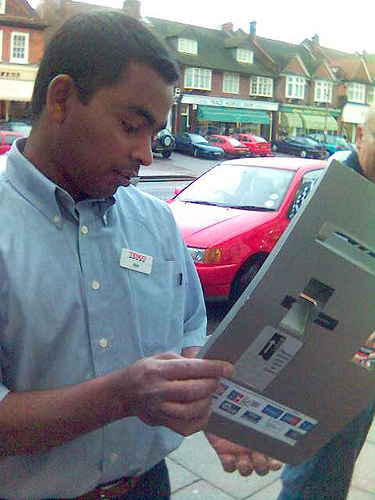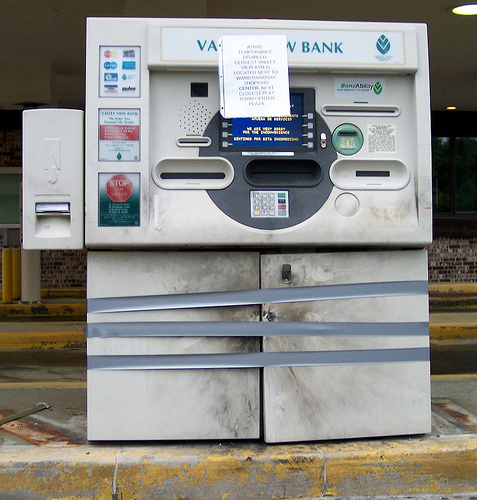Will a crackdown on illegal immigration mean that 13 - 20 million people will need to use legitimate social security numbers to work? In response to increasing concerns about illegal immigration, the Department of Homeland Security provides what is known as the Basic Pilot Program (web based), which verifies the validity of a social security number.
The problem is that it only verifies, whether or not the number is good (matches). It doesn't show if the number is stolen, or even if the name matches the number.
Please note that this program is a great tool, but it isn't the only tool that should be used when verifying a person's identity. Even DHS is quick to point this out in the article I cite further down in this post.
You would think it would be in an employer's best interests to do a thorough background check. Employee fraud and abuse can cost them a lot of their hard-earned profits!
If certain employers use this tool and this tool alone will 13-20 million immigrants use 13-20 million legal citizens' social security numbers to obtain employment?
The LA Times did a story about a LA County financial crimes detective, who had his own identity stolen by illegal immigrant(s). The investigation of financial crimes normally involves investigating a lot of identity theft.
The victim in this case, Detective Flores eventually confirmed that at least one of the people using his identity had been picked up in the
Swift raids, which occurred late last year.
Anna
Gorman (LA Times) wrote:
Under pressure from federal authorities to verify their workers' legal status, more employers are checking the validity of Social Security numbers, and that has caused many illegal immigrants to use stolen rather than made-up numbers to get jobs, immigration officials said.
"It used to be that we would only see people come in with purely bogus documents," said Julie L. Myers, assistant secretary for U.S. Immigration and Customs Enforcement. "More and more we are seeing real people, real victims."
Although the agency does not break out identity theft statistics, Myers said, "we are definitely seeing a trend."
To better protect their businesses, more employers are using the Department of Homeland Security's Basic Pilot program, which enables them to check the validity of Social Security numbers online. But Basic Pilot doesn't detect identity theft. As long as the name and Social Security number are legitimate, the online system will indicate the person using them is authorized to work.
Word of this weakness in the system has spread quickly among illegal immigrants and the document theft rings that cater to them. Thieves will dig through trash cans or scan the Internet looking for Social Security numbers. Sometimes, criminals or homeless people are willing to sell their identity documents, Myers said.
There also have been cases in which employers provide their workers with stolen numbers, Homeland Security authorities said.
Detective Flores didn't lose any money, but was threatened by collection agencies and the IRS. Like the many other victims of identity theft, he probably went through a lot of pain and suffering and spent countless hours clearing his name.
Trying to do the right thing, Detective Flores tried to have his social security number changed, but his request was refused.
If employers aren't checking very carefully and only using the Department of Homeland Security's Basic Pilot System, the background checks aren't likely to be very effective.
The trick would be to run Social Security Numbers verifying some minor details, which might include:
- Multiple names coming back to the same SSN (common).
- Geographical areas that don't match the stated history on the employment application.
- Discrepancies in ages, or where the social security number was issued.
This can be accomplished pretty easily by any employer. Even if an employer doesn't run a credit check, where discrepancies would normally surface, social security number traces are available from any of the major credit bureaus.
A social trace shows the name and address information, without the financial track record of the person.
There are privacy laws to protect this information -- but just about any legitimate employer can access this information, if they really want to -- and do so, legally. In most cases, a release form signed by the applicant is all that is needed. It isn't very hard to get someone to sign a release form, if they want a job.
Data brokers sell services to businesses, where social security numbers are easily run, also. If someone knows how to read these reports (they aren't difficult), it normally isn't very hard to find the real person (identity theft victim), when questionable activity is present. They are normally listed right on the report.
Besides performing background checks, social security traces are used to find people by law enforcement, collectors and private investigators. Financial crimes investigators (like Detective Flores) use them to find the people being impersonated by identity thieves, frequently.
A simple Google search on social security traces reveals how many vendors offer this service,
here.
If illegal immigrants were using totally bogus social security numbers before, it isn't going to be hard for them to get real ones. This information is sold all over the place, including the Internet.
Organized criminal groups market both the information and documents on an economy of scale, which assures that their services are available to just about anyone for a nominal charge.
The bottom line is that it isn't hard for an employer to do an effective background, especially given the tools provided in the information age. In fact, a lot (most) of them already do this. As I stated earlier, employee fraud and abuse can be pretty detrimental to a company's bottom line.
As long as the jobs are available, illegal immigration will continue to be a big problem. If labor is needed and people want to realize the American dream, the people seeking the dream and those providing the jobs, need to accomplish their goals in a legal manner.
It isn't fair for them to accomplish their needs and goals at the expense (pain and suffering) of other people, who are following the law.
LA Times article,
here.
Lou
Dobbs discusses a holistic (common sense) approach to this problem on his television show and
website. He also provides links to where all of us can let our politicians know how we feel about this problem.
Recently, the voice of the nation let them know exactly how we feel about this matter.
In the end, illegal immigrants might be the least of our worries. Activity like this shows how easily terrorists and criminals can operate inside our borders, also. This is probably the best argument (I know of) for why
we can no longer afford to let criminals control our borders.











